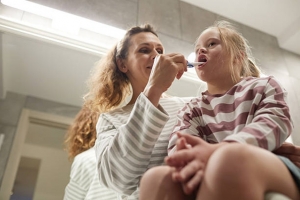Test Owner
NHS England has released updated guidance to help acute trusts and community health providers better implement the Mental Capacity Act (MCA) 2005 for adults with learning disabilities. The guidance is designed to help frontline healthcare professionals fulfil their legal responsibilities while making reasonable adjustments to support individuals with additional needs.
The document includes tools such as mental capacity assessment checklists and templates for recording best interest decisions, with leadership teams urged to ensure the guidance is well understood and accessible to all staff. It reinforces the importance of collaboration when assessing a person’s capacity - particularly involving those who know the individual best, including carers, family members, and specialist staff.
A key element of the guidance is the two-stage assessment process: first identifying any disturbance in the functioning of the mind or brain, followed by determining whether this prevents the person from making a specific decision, even with support. It also stresses the importance of involving families in decision-making and ensuring they are offered support and advocacy services where appropriate.
However, challenges remain. The guidance highlights ongoing barriers, such as insufficient training, pressures in busy clinical settings, and misunderstandings around conditions and capacity. These issues can lead to poor implementation and undermine the legal rights of individuals with learning disabilities.
A new research project is aiming to improve dental care for individuals with learning disabilities by using creative methods to make dental visits more accessible and supportive. The "Caring Beyond Words" project, led by the University of Plymouth and funded by the NIHR, will explore how art and innovative communication can help transform patient experiences in dental settings.
The initiative will involve collaboration between researchers, individuals with learning disabilities, and healthcare professionals to identify current gaps in care. Pilot schemes will be trialled within dental practices to test new approaches, ensuring they are effective and can be integrated into mainstream services.
Evidence shows that people with learning disabilities often face poorer oral health and are more likely to be hospitalised for dental issues, particularly during childhood. As they get older, their oral health can decline quickly if appropriate support is not in place. This project builds on earlier work by the University that brings together health and the arts to support patients who face barriers to care, including dental anxiety.
Working closely with partner organisations such as Learning Disability England and Cornwall Partnership NHS Foundation Trust, the project will ensure the voices of those directly affected are heard, helping shape more inclusive and responsive dental services for the future.
The number of children referred to mental health services for neurodevelopmental conditions such as autism and ADHD has risen by nearly 30%, despite these not being classed as mental health conditions. A new report from the Children’s Commissioner reveals growing pressure on services and significant delays in care.
As of March 2024, more than 958,000 children in England had active referrals to Children and Young People’s Mental Health Services (CYPMHS), up by 10,000 from the previous year. Children with suspected autism are facing some of the longest delays, with 64% still waiting for treatment and average waiting times reaching 223 days.
The most common referral reason was anxiety (16%), followed by neurodevelopmental issues excluding autism (11%), suspected autism (6.8%), and children in crisis (6.2%). The report also found stark regional inequalities, with average waits ranging from six days in Leicester to over 100 days in Hampshire.
Children’s Commissioner Dame Rachel de Souza has called for urgent action, including an independent review of autism services and greater investment in community-based support, particularly for children from marginalised groups. Without meaningful reform, many children risk missing out on education and vital developmental support.
A new NHS initiative is being launched nationwide to help reduce the risk of avoidable brain injuries in newborns during childbirth. The programme, called Avoiding Brain Injuries in Childbirth (ABC), is designed to support maternity staff in recognising signs of distress in babies during labour and taking timely action to prevent long-term conditions such as cerebral palsy.
Set to begin in September, the programme has been developed with input from hundreds of maternity professionals, including midwives, anaesthetists and obstetricians. It follows a successful trial across nine maternity units and is being led by the Royal College of Obstetricians and Gynaecologists, the Royal College of Midwives, and The Healthcare Improvement Studies Institute (THIS Institute).
The ABC programme focuses on improving care in two key risk areas: detecting and responding to signs of fetal deterioration during labour, and managing cases where a baby’s head becomes stuck during a caesarean section. By introducing evidence-based tools and consistent protocols, the aim is to help teams deliver quicker, more coordinated care in emergency situations.
Health Secretary Wes Streeting emphasised the importance of the programme as part of wider reforms to improve maternity services. He also highlighted ongoing efforts to recruit and train more midwives and ensure women’s voices are central to future changes in maternity care.
Netflix is supporting a unique drama diploma created specifically for autistic individuals and people with learning disabilities, aiming to improve disability representation in the UK’s television industry. Although 20% of the UK population lives with a disability, only 8% of TV characters reflect this – a gap this initiative hopes to close.
The diploma, developed by Access All Areas in collaboration with The Royal Central School of Speech and Drama, is the first of its kind globally. It focuses on nurturing students’ creativity while building confidence, communication skills, and independence. Feedback from previous cohorts has been overwhelmingly positive, with most reporting personal growth and a stronger sense of self-expression through the performing arts.
Since its inception in 2013, nearly 80% of graduates have gone on to work professionally in the creative industries. Alumni have landed roles in popular television dramas and collaborated with major broadcasters and theatres across the UK, including the BBC, ITV, National Theatre, and the Royal Court. This programme is helping to pave the way for a more inclusive and representative entertainment industry.
Netflix says its involvement is part of a long-term commitment to amplifying diverse voices, supporting new talent, and helping to break down barriers faced by disabled and neurodivergent artists.
Autism diagnoses have surged dramatically in recent years, with figures in the UK showing an eightfold increase since 1998. Experts suggest this growth is not necessarily due to a rise in the number of autistic people, but rather a broader definition of what autism includes. Once focused on children with high support needs, the diagnostic criteria now encompass a wider range of traits, including those found in people previously diagnosed with Asperger’s and PDD-NOS.
This expanded understanding has led to greater recognition of autism in adults and women, two groups historically underdiagnosed. Girls, in particular, often mask their traits and were more likely to be diagnosed with mental health conditions in the past. Increased awareness and updated research have helped identify many previously overlooked cases.
The shift has also seen more adults receiving diagnoses, often with fewer support needs. Some see this as overdue recognition, while others worry that public understanding is being skewed by a focus on "milder" portrayals in media.
Though some speculate environmental factors may play a role, researchers like UCL’s Ginny Russell argue the rise in diagnoses is largely cultural. Changing perceptions and a wider net for diagnosis explain the boom, with genetics still seen as the main underlying cause of autism.
A recent UK study has highlighted the continued use of psychotropic drugs among adults with learning disabilities in community and supported living settings, often prescribed for behaviours that challenge, despite the absence of a diagnosed severe mental illness. The findings, published in Research in Developmental Disabilities, reveal that nearly half of those assessed were prescribed antipsychotics, followed by antidepressants, anti-epileptics, and benzodiazepines.
The research found significant levels of polypharmacy, with 45% of individuals taking more than one type of psychotropic medication, and 20% receiving both antipsychotics and antidepressants. These prescribing practices persist despite limited clinical justification and strong guidance advising against such approaches without robust, multi-disciplinary interventions in place.
Medication data was gathered from 112 adults as part of a feasibility randomised controlled trial involving SPECTROM – a staff training initiative developed to support NHS England’s STOMP campaign, which aims to reduce the overuse of psychotropic drugs in people with learning disabilities and autism. Encouragingly, the study showed that individuals supported by staff trained through SPECTROM were more likely to experience reduced medication doses over six months.
National guidance advises that antipsychotics should only be used when combined with psychosocial interventions. These approaches, such as positive behaviour support and communication therapies, aim to address underlying causes of distress and promote healthier, non-pharmacological ways of managing behaviours that challenge.
New figures from the CDC in the United States reveal that one in every 31 children is now diagnosed with autism by the age of eight. The data, gathered from 16 communities in 2022, also shows that children from Asian or Pacific Islander, Black, and Hispanic backgrounds are more likely to receive an autism diagnosis compared to white children. Boys remain more frequently diagnosed than girls, although the gap is narrowing.
The CDC notes that increased early identification is likely a key factor in the rise, especially as more children born in 2018 were diagnosed by age four than those born in 2014. The Autism Society of America has stressed that this growing prevalence does not point to an epidemic but rather to progress in recognising autism earlier, calling for further improvements in early screening and timely access to services.
Across the Atlantic, the UK faces a growing crisis in autism assessment. NHS figures show over 212,000 people were waiting for an assessment as of December 2024 – an 82% increase in two years. Despite NICE guidance stating no one should wait longer than 13 weeks, 90% of those waiting have already surpassed this timeframe.
The British Medical Association warns that these delays can severely hinder a child's development. Campaigners are urging for ringfenced funding to enforce NHS England’s Autism Assessment Framework, highlighting the urgent need to strengthen diagnostic services and provide adequate support.
A grassroots initiative created to support families struggling with lengthy NHS waiting times for autism and ADHD assessments has now gained charity status. The Roxi Foundation, based in Swindon, Wiltshire, was launched by the family of a young woman who faced years of challenges before finally receiving diagnoses for both conditions.
Founder Matt Pound, Roxi’s father, explained that their experience made him realise many other families were facing the same barriers. “If we found it that hard, I knew we couldn’t be the only ones,” he said. The charity offers grants to cover the cost of private assessments, giving families quicker access to support services.
One parent, Julian, shared how his daughter Hannah had become withdrawn and non-verbal while waiting over two years for help. The Roxi Foundation stepped in to fund a private assessment, leading to diagnoses of autism and ADHD. “She’s like a different child now – more engaged and communicative,” Julian said, who now helps raise funds for the charity.
While the cost of private assessments limits how many families can be supported, the foundation has already helped three young people and raised £7,000 in 2024, with a £20,000 fundraising goal for 2025. The NHS says it is working on earlier intervention and new neurodevelopmental care pathways to improve access.
Leading charities have written to Stephen Kinnock MP, Minister of State for Care, calling for immediate action after figures revealed that 2,025 autistic individuals and people with learning disabilities are still being detained in mental health hospitals.
Despite previous commitments to reduce these numbers, the Government has delayed changes to detention laws, stating that reforms outlined in the Mental Health Bill won’t be enacted until it is confident sufficient community-based support is in place. The National Autistic Society, Mencap, and The Challenging Behaviour Foundation are among the organisations urging ministers to publish a clear, detailed strategy without further delay.
One year has passed since the Government and NHS missed their 2024 target to halve the number of people detained since 2015. Alarmingly, rather than falling, the number of autistic people detained has risen by 4% since then. Overall, detentions have increased by 136% since 2015 - highlighting a worsening crisis.
Although a new target of a 10% reduction by March 2026 has been introduced, campaigners say this lacks direction and ambition. Mel Merritt from the National Autistic Society stressed the urgent need for a coordinated Government plan, warning that without one, people will continue to face long, harmful detentions - often lasting nearly five years - in institutions not designed to meet their needs.












